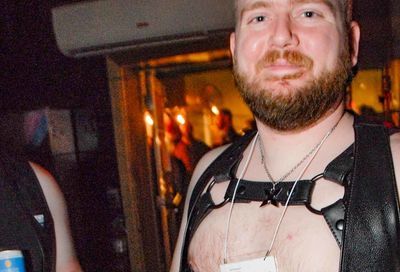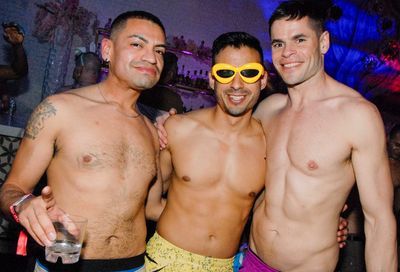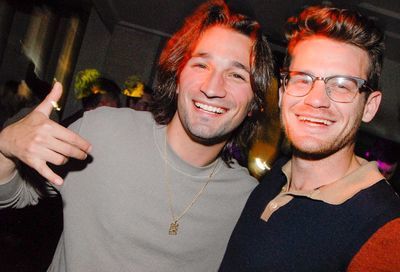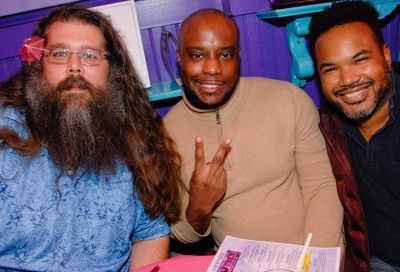Russell T. Davies: Pushing Boundaries
Russell T. Davies hasn't shied from tackling a wide variety of issues, but it's the LGBT content he'll be best remembered for

Russell T. Davies has never shied from pushing boundaries.
In a career spanning thirty years, Davies has brought LGBT issues to the forefront of his various works, adding to the national dialogue in his native Britain. Indeed, during the ’90s and early ’00s, as British gays toiled under “Section 28” — a law preventing local government from teaching students that being gay was perfectly normal — Davies fought to confront bigotry and stigma in his various works, to present LGBT characters as regular humans, with the dramas and emotions that entails.
Take a show from 1993, as an example. Davies freelanced on Children’s Ward, a medical drama for children, offering scripts which included a teenage boy who had been infected with HIV via a blood transfusion, at a time when the notion that only gay people contracted the disease was still prevalent. “You must be a poof if you’ve got AIDS,” one bully posited. “I’m not gay, and I haven’t got AIDS,” the character responded. “I’m HIV positive.” For children’s television, this was groundbreaking, and Davies would later win a BAFTA (the British equivalent of an Emmy) for an episode dedicated to the online threat of pedophiles in chatrooms.
Davies applies the same frank, unabashed storytelling to his adult works. He continued to challenge society’s expectations of content with the series he wrote for. In soap opera Revelations, Davies — inspired by the ordination of the first female vicars in the Church of England — introduced a lesbian vicar, who came out in a dramatic two-hander episode. With The Grand, set in a Manchester hotel in the 1920s, Davies explored homosexuality and societal attitudes at the time with a closeted barman. That was part of a series that also dealt with abortion, murder, army desertion and the death penalty.

It was Davies’ own sexuality, and his experience with a drug overdose and subsequent existential crisis, that led to perhaps his most popular LGBT work: Queer as Folk. Revolutionary at the time, it depicted sexuality in a way no show had before. It was a sexy, honest, open portrayal of the gay scene in Manchester, the sort of hedonistic life Davies was trying to leave behind. Its pilot episode premiered as the British parliament was discussing a bill that would reduce the age of consent for homosexual couples to 16, matching their heterosexual counterparts. The series generated praise from many, with a record numbers of viewers, but also a large amount of controversy. British regulators received complaints for its content, a renowned conservative activist decried it, while the parents of Charlie Hunnam, who played 15-year-old Nathan Maloney, were opposed to their son’s character having sex with an older man.
The British version ran for just one full season, plus a two-episode second season that wrapped up the story. Showtime partnered with Canadian network Showcase for an American remake, which ran for five seasons and tackled issues such as HIV and same-sex marriage, becoming immensely popular in its own right, but Davies wasn’t involved. Instead, he was doing what he does best: stirring up more debate.
Bob and Rose sounds like any other romantic drama. Boy meets girl, boy falls in love with girl — except here, the boy is gay. It created a storm of controversy among some gay viewers, who viewed it as conforming to the ideals of religious activists who maintain that homosexuality is a choice, but for Davies it was based on fact. A friend, who was openly gay, met a woman and decided to marry her and have children. Bob wasn’t bisexual, which further confounded people, but Davies had him sum his sexuality up thusly: “I fancy men. And her.”
Simultaneously, Davies was again challenging societies attitudes towards homosexuality. A subplot involving Bob’s mother and the fictional “Parents Against Homophobia” saw the group campaigning for the repeal of Section 28, including protesting a coach company that donated money to keep the law in place — a very real parallel to a renowned British coach company that donated to efforts to maintain the homophobic law. Section 28 would be repealed in 2003, two years after Bob and Rose‘s one series had ended its critically successful, but commercially disastrous, run.
It was in 2005, however, that Davies would find himself at the forefront of British drama. A Doctor Who fan since childhood, Davies’ lobbied the BBC for years to revive the sci-fi show until they eventually awarded him the chance to do so. His changes to the original format were sweeping — doubling the episode length, recording on film, maximizing every penny of the special effects budget, and cutting any superfluous story elements that had accumulated over the show’s forty-year existence to that point. It was an immediate success. The show found its footing in its second season, cementing Davies and his core team of writers as masters of family-friendly, primetime drama, underscored with action, humor and pathos. If Davies had any worries about how his version of Doctor Who would be received, they were banished once the incredible viewing figures became apparent.
Still, it was in Doctor Who offshoot Torchwood where Davies would once again flex his provocative muscle. Centered on a covert organization that prevents extraterrestrial life from reaching the public eye, it was darker, sexier, and a hell of a lot gayer. Time-travelling lead character Jack Harkness — Doctor Who‘s first ever LGBT character — was pansexual, with one character commenting that he’d have sex with “anybody as long as they’re gorgeous enough!” Harkness embarks on a relationship with Ianto Jones, which spans the show’s run, but the series as a whole was rife with sexy, funny, and gut wrenchingly emotional moments for the character.
In the episode “Captain Jack Harkness,” Harkness is pulled through time to a dance hall in the ’40s, meeting the man whose identity he stole, Captain Jack Harkness. The pair realize their attraction for one another, but given the social standards of the time, are unable to express it. The episode ends with the men dancing and kissing, to the shock of the other partygoers, before Torchwood‘s Harkness is pulled back to present day. It was a beautifully tragic moment — and not just because both characters were men. It’s no wonder it was nominated for a Hugo Award for Best Dramatic Presentation.
In thirty years, Davies hasn’t shied from tackling a wide variety of issues, but — apart from reviving Doctor Who into the fantastic series it is today — it’s his LGBT content that he’ll likely be most remembered for. Where others would introduce gay characters in glimpse-and-you’ll-miss-it fashion, or as broad caricatures, or indeed not show them at all, Davies has pushed them to the fore and into living rooms around the world, helping shape conversation and generate debate.

It seems almost bizarre to consider his new shows, Cucumber and Banana, as spiritual successors to Queer as Folk, as the societies each takes place in are worlds apart. Davies’ latest series exist in a world where Britain has marriage equality, nondiscrimination laws, and LGBT people are free to live and love as they choose. Davies doesn’t need to push boundaries to the same extent — these people aren’t fighting to be recognized, to have their stories heard, in the same way as his characters from ten or twenty years ago.
Still, that their stories are being told at all, and with the wit and drama Davies has become known for, is something to celebrate. Especially in America, where there are still so many LGBT battles left to fight, two shows about LGBT people living their lives — however dramatized and sex-filled — is exactly what we need. For Davies? Well, lets hope he won’t have to keep pushing those boundaries — but it makes for damn good television when he does.
Support Metro Weekly’s Journalism
These are challenging times for news organizations. And yet it’s crucial we stay active and provide vital resources and information to both our local readers and the world. So won’t you please take a moment and consider supporting Metro Weekly with a membership? For as little as $5 a month, you can help ensure Metro Weekly magazine and MetroWeekly.com remain free, viable resources as we provide the best, most diverse, culturally-resonant LGBTQ coverage in both the D.C. region and around the world. Memberships come with exclusive perks and discounts, your own personal digital delivery of each week’s magazine (and an archive), access to our Member's Lounge when it launches this fall, and exclusive members-only items like Metro Weekly Membership Mugs and Tote Bags! Check out all our membership levels here and please join us today!





















